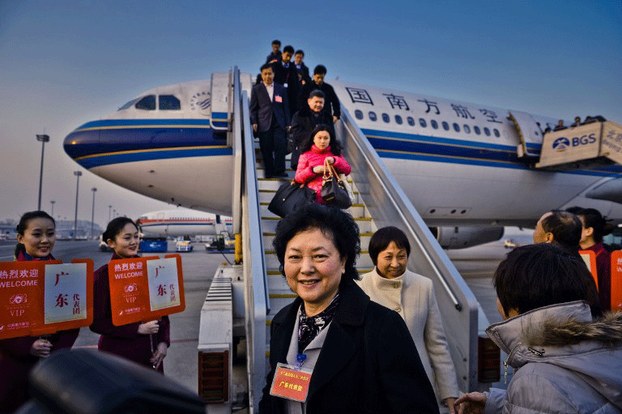




A recent bid by authorities in the southern province of Guangdong to stop ruling Chinese Communist Party officials from sending their families and assets overseas has highlighted a growing trend nationwide, but may achieve little in the absence of democratic checks and balances, analysts said.
The Guangdong government has demoted or removed some 900 mostly middle-ranking cadres in recent months after finding that their spouses or children are permanently resident overseas, while they continue to work in China, official media reported.
Those who do this have been dubbed "naked officials" by the Chinese public, which is growing increasingly angry over the practice and other forms of blatant official corruption.
Thousands of Chinese officials are believed to have left China in recent years, taking tens of billions of dollars with them, independent researchers claim.
The move to demote, or force to resign or retire "naked officials" is the first of its kind by a provincial government.
It follows a party directive in January stating that such officials will no longer be eligible for promotion.
But analysts said that many of the measures rely on self-disclosure by the officials themselves, with no independent vetting procedures to circumventing those who lie outright about their family circumstances.
"The fact that China is taking such measures against naked officials is in itself the product of a dictatorial regime," Guangzhou-based independent writer Xu Lin told RFA.
"These sorts of measures to combat naked officials are unlikely to be implemented [in a broader manner] unless China implements democracy," he said.
Improving image
According to Liao Ran, an Asia program officer for the Berlin-based anti-corruption group Transparency International, the government's chief aim in going after such officials is to improve its image, not to wipe out the problem.
"These officials are Communist Party cadres, and if they, as leaders of the country, have no confidence in their country's future, how can they ask the general public to have confidence?" he said.
"There is a strong reaction against naked officials among the general public right now," Liao said. "There is a popular joke that says poor people love their country, their leaders betray it, while the rich just leave it."
"Naked officials are a mixture of rich people and leaders," he said.
He said what was begun in Guangdong could be rolled out nationwide, as part of an ongoing crackdown on graft launched by President Xi Jinping after he took power in November 2012.
"This does seem to give the lie to the view, often expressed overseas, that Xi Jinping's anti-corruption campaign is nothing but an excuse to go after his political enemies or to wage power struggles," Liao added.
But Xu said such a plan could only work alongside a radical overhaul of the entire political system.
"If they don't reform the system and still try to fight corruption, then the Chinese government will likely just implement some more of the weird measures like those we have seen in Guangdong," he said.
Last year, Chinese authorities arrested 762 people suspected of work-related crimes who had been on the run and retrieved illegal gains worth 10 billion yuan (U.S. $1.6 billion), the state prosecutor reported.
However, it gave no details of their location at the time they were detained.
In 2012, former Fengcheng city party chief Wang Guoqiang fled China along with his wife and some U.S. $30 million to live with his daughter, who was already in the United States, prompting a graft investigation.
Wang was fired from party and government, but remains with his family outside China.
And former railways ministry chief engineer Zhang Shuguang is currently awaiting trial in an U.S. $8 million bribery case after his wife and daughter moved to a large mansion in California.
Reported by Wen Jian for RFA's Mandarin Service. Translated and written in English by Luisetta Mudie.